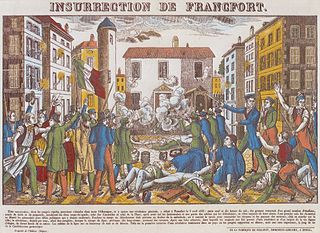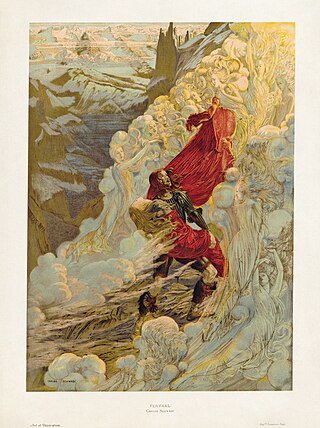Related Research Articles

The Frankfurter Wachensturm on 3 April 1833 was a failed attempt to start a revolution in Germany.

Fervaal, Op. 40, is an opera in three acts with a prologue by the French composer Vincent d'Indy. The composer wrote his own libretto, based in part on the lyric poem Axel by the Swedish author Esaias Tegnér. D'Indy worked on the opera during the years 1889 to 1895, and the score was published in 1895.
Martin Eybl is an Austrian musicologist.
Christian Mengis was a German composer and horn player of the late Baroque era.
Friedrich Wilhelm Riedt was a German flautist, composer and music theorist of the Baroque period.
Christoph-Hellmut Mahling was a German musicologist and lecturer at various universities.

Joseph Maria Müller-Blattau was a German musicologist and National Socialist cultural official. He is regarded as a "nestor of Saarbrücken musicology" but also as a "singer of a musical seizure of power" because of his activities in National Socialism.
Fred K. Prieberg was a German musicologist. He was a pioneer in the field of history of music and musicians under the Nazi regime.
Albrecht Riethmüller is a German musicologist.
Helmuth Osthoff was a German musicologist and composer. Much of his career was spent at Frankfurt University, prior to which he held posts at Halle University and Berlin University. He wrote the first major biography on the composer Josquin des Prez, published as a two volume monograph in 1962 and 1965
Peter Petersen is a German musicologist and professor emeritus of the University of Hamburg. He focus on 20th-century music, rhythm, and was instrumental in the university's Exile Music Working Group and the online Lexikon verfolgter Musiker und Musikerinnen der NS-Zeit.
The Strub-Quartett was a well-known German string quartet from Berlin (1929–1945) and Detmold (1945–1965), named after primarius Max Strub.
Jost Raba was a German violinist and music educator.

Jan Dahmen was a Dutch violinist. He was the first concertmaster of the Staatskapelle Dresden and of the Royal Concertgebouw Orchestra in Amsterdam.
Werner Gustav Rudolf Gößling was a German conductor, Choir director, composer and university lecturer. He was chief conductor of the Philharmonisches Staatsorchester Halle and the Robert Franz Singakademie in Halle. In 1951, he was appointed General Music Director. From 1956 to 1958, he built up the first Chinese symphony orchestra in the European style.
Fritz Reuter was a German musicologist, music educator, composer and Kapellmeister. Reuter was one of the most important German music educators of the 20th century. After studying music and musicology in Dresden and Leipzig, with Teichmüller, Riemann, Schering and Abert, he received his doctorate in 1922. In 1945, he was appointed Kapellmeister at the Volksoper in Dresden. In 1949, he was appointed as the first professor of music education at a German university. He was also director of institutes at the Martin Luther University of Halle-Wittenberg and the Humboldt University Berlin. In 1955, he was one of the initiators of the first Hallische Musiktage.
Walter Draeger was a German composer and music educator. Er war Professor an der Staatliche Hochschule für Theater und Musik Halle and the Hochschule für Musik Franz Liszt, Weimar. In 1955, war er Mitinitiator der ersten Hallische Musiktage.
Otto Moritz Martin Riemer was a German music historian and music critic.
Horst Förster was a German conductor, choirmaster, violinist and university teacher. In 1952, he was appointed the youngest General Music Director of the GDR in the Landestheater Eisenach. Afterwards, he was chief conductor of the Philharmonisches Staatsorchester Halle and the Singakademie Halle (1956–1964) as well as the Dresden Philharmonic (1964–1966), and of Belgrade Philharmonic Orchestra from 1985-1986.
Manfred Lewandowski was a German-American cantor, classical baritone and composer.
References
- ↑ "La vie musicale" (in French). Retrieved 2 August 2020.
- ↑ "Rezension: "Spalek der Musikwissenschaft"" (in German). Retrieved 2 August 2020.
- ↑ "Schriften zur politischen Musikgeschichte" (in German). Retrieved 2 August 2020.
- ↑ Wagner-Rezeption und französische Oper des Fin de Siècle. Untersuchungen zu Vincent d’Indys Fervaal on WorldCat
- ↑ Pluralismus wider Willen? : stilistische Tendenzen in der Musik Vincent d'Indys on WorldCat
- ↑ Quellen zur Geschichte emigrierter Musiker 1933–1950. Vol. 1: Kalifornien. on WorldCat
- ↑ Conrad Ansorge. Ein Pianist des Fin de Siècle in Berlin und Wien. on WorldCat